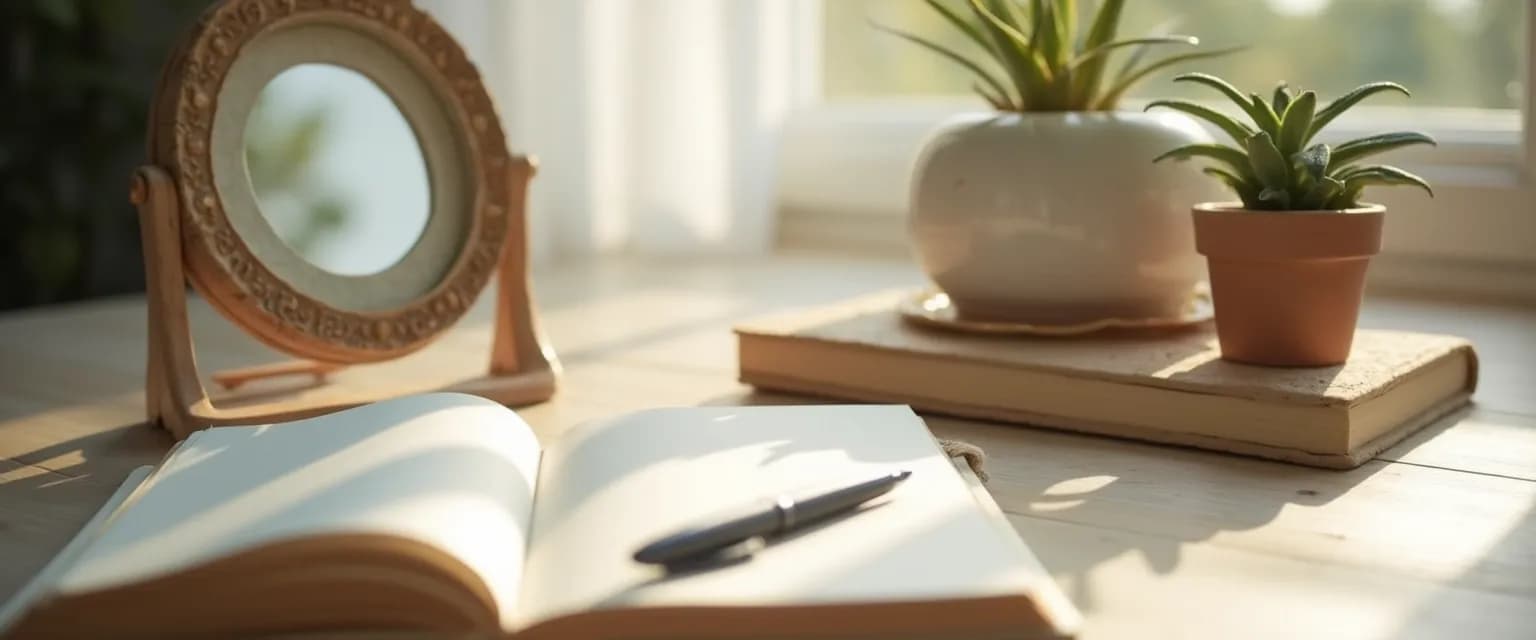Mirror Journaling: Enhance Self Exploration and Self Awareness Today
Ever caught yourself staring at your reflection, wondering what's really going on beneath the surface? You're not alone. The journey of self exploration and self awareness often begins with that curious glance in the mirror. But what if that mirror could become more than just a reflective surface? What if it could become a powerful tool for personal growth?
Mirror journaling is revolutionizing how beginners approach self exploration and self awareness. Unlike traditional journaling where you simply record thoughts, mirror journaling creates a dialogue with yourself—literally facing your own reflection while asking pointed questions about your emotions, reactions, and patterns. This technique is particularly effective because it bypasses our natural tendency to avoid uncomfortable truths when we're just writing on a page. The mirror doesn't let you hide; it reflects both your physical self and, with practice, your inner landscape.
Neurologically speaking, making eye contact with yourself while reflecting activates different neural pathways than writing alone. This mindfulness technique creates a unique state of self-awareness that psychologists find particularly effective for emotional processing. For beginners seeking accessible self exploration and self awareness practices, mirror journaling offers a structured approach without the intimidation of blank pages.
The Core Practice of Mirror Journaling for Self Exploration and Self Awareness
Setting up your mirror journaling practice requires minimal preparation but yields maximum insight. Find a quiet space with a mirror where you won't be disturbed. Sit comfortably at eye level with your reflection, and take a few deep breaths to center yourself. The physical setup is simple, but the mindset is crucial—approach with curiosity rather than judgment.
The power of mirror journaling for self exploration and self awareness lies in the questions you ask. Start with gentle inquiries like "How are you really feeling today?" or "What made you smile this week?" As you grow comfortable with the practice, deepen your exploration with questions such as "What patterns do I notice in my emotional responses?" or "What am I avoiding looking at in my life?"
Mirror Journaling Questions
Structure your reflection time by focusing on one question per session. Spend 3-5 minutes maintaining eye contact while verbally responding to your chosen question. The emotional awareness practice of watching your facial expressions as you answer can reveal insights that words alone might miss.
When emotions arise during mirror journaling—and they will—observe them with compassion. Notice if you look away when discussing certain topics or if your expression changes. These physical cues provide valuable data for your self exploration and self awareness journey. Remember, the goal isn't to judge these reactions but to notice them with gentle curiosity.
The distinction between observation and judgment is crucial in mirror journaling. Instead of thinking "I'm bad at handling criticism," try "I notice my shoulders tense when I discuss receiving feedback." This shift from judgment to observation is where true self exploration and self awareness flourishes.
Transforming Your Self Exploration and Self Awareness Through Regular Practice
Integrating mirror journaling into your daily routine doesn't require hours of commitment. A 5-minute approach works wonderfully—perhaps as part of your morning or evening routine. The consistency matters more than the duration. Many practitioners find that linking it to an existing habit (like brushing teeth) helps maintain the practice.
To track your progress in self awareness, notice how your initial discomfort with the mirror gradually transforms into familiarity and then insight. Many beginners report feeling awkward during their first sessions but experience breakthrough moments within just two weeks of regular practice.
Common challenges in the mirror journaling process include feeling self-conscious, experiencing emotional resistance, or struggling with consistency. When these arise, remember they're actually part of the journey—each resistance point offers valuable information about your relationship with yourself.
As you advance in your mirror journaling practice, you might explore deeper self-reflection techniques like tracking patterns across sessions or exploring specific themes (relationships, work, aspirations) through targeted questions. Some practitioners even record voice memos during their sessions to capture insights that might otherwise be forgotten.
The journey of self exploration and self awareness through mirror journaling offers a structured yet deeply personal path to understanding yourself better. By regularly showing up at the mirror with curiosity rather than criticism, you create a powerful practice that reveals not just who you are today, but who you're becoming. The mirror doesn't lie—but with practice, it does reveal truths that can transform your relationship with yourself and others.




